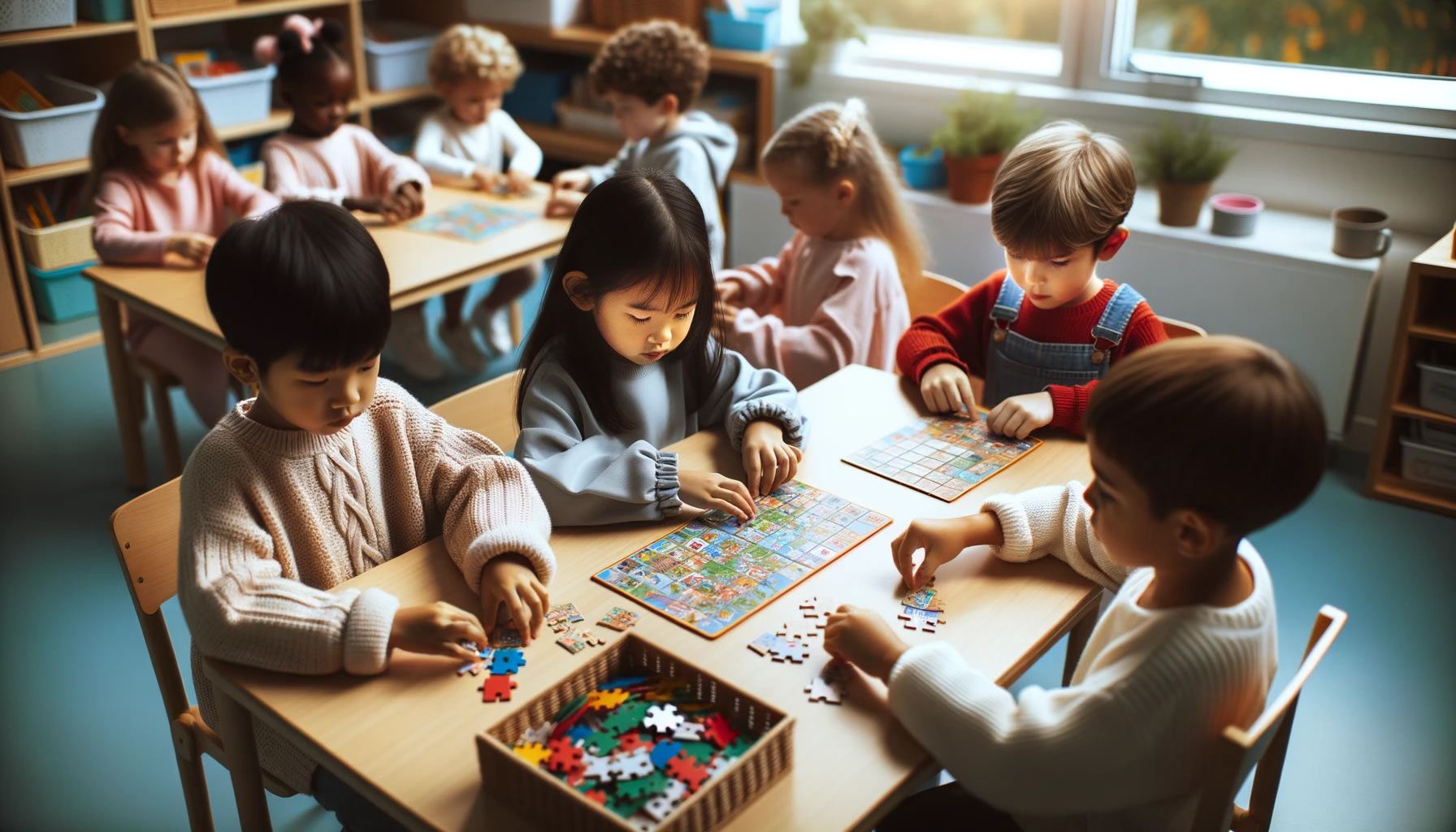In the digital age, parents are constantly seeking ways to stimulate their child’s mental development. With numerous options available, it can be challenging to determine which activities are most beneficial. In this article, we will explore the effectiveness of three popular choices: Word Games, Solving Puzzles, and Matching Picture Cards. We’ll help you decide which one is best for your child’s cognitive growth.
Intellectual Games – A Mental Workout
Intellectual games play a vital role in shaping a child’s cognitive development. These games encompass a wide range of activities, including Word Games, Solving Puzzles, and Matching Picture Cards, among others. Here, we’ll delve deeper into how intellectual games positively impact children’s intellectual growth.
- Enhancing Problem-Solving Skills: Intellectual games challenge children to think critically and solve complex problems. Whether it’s figuring out a crossword puzzle clue, finding the missing puzzle piece, or matching picture cards, these activities encourage kids to analyze information, make connections, and develop effective problem-solving strategies.
- Boosting Vocabulary and Language Skills: Many intellectual games, such as Word Games, revolve around language and words. Engaging with these games regularly can expand a child’s vocabulary, improve their spelling, and enhance their understanding of grammar and syntax. As children encounter new words and meanings, their communication skills become more robust.
- Fostering Creativity and Imagination: Intellectual games often require children to think outside the box. For example, when they engage in creative Word Games like storytelling or inventing new words, they exercise their imagination. This imaginative play is essential for developing creativity, which can be applied to various aspects of life.
- Building Concentration and Focus: To excel in intellectual games, children must maintain concentration and focus. Solving complex puzzles or matching picture cards demands their undivided attention. These activities can help improve a child’s ability to concentrate on tasks, an essential skill for academic success and everyday life.
- Developing Spatial and Visual Skills: Puzzles and visual matching games, in particular, enhance a child’s spatial awareness and visual discrimination skills. They learn to recognize patterns, shapes, and spatial relationships, which can be valuable in fields such as mathematics and art.
- Encouraging Persistence and Resilience: Intellectual games often present challenges that require perseverance. When a child faces a tough puzzle or word challenge, they learn the value of persistence and resilience. This determination to overcome obstacles can carry over to other aspects of their lives, helping them tackle challenges with confidence.
- Promoting Social Interaction: Many intellectual games can be enjoyed with others, whether it’s a friendly game of Scrabble or a collaborative puzzle-solving session. These interactions promote social skills, including teamwork, communication, and sportsmanship. Additionally, discussing strategies and solutions with peers or adults enhances their learning experience.
- Stimulating Cognitive Development: Intellectual games engage multiple aspects of a child’s cognitive functioning, including memory, reasoning, and problem-solving. Regular engagement in these activities can have a positive impact on overall cognitive development, potentially leading to better academic performance.

In summery, intellectual games offer a wide array of benefits for children’s intellectual development. These games stimulate problem-solving skills, boost language proficiency, foster creativity, and enhance various cognitive abilities. Moreover, they encourage qualities like persistence and social interaction. By incorporating intellectual games into a child’s routine, parents and educators can provide a fun and effective way to support their intellectual growth and overall development.
Word Games : A Mental Workout Word Games, such as crossword puzzles, word searches, and Scrabble, are excellent tools for enhancing a child’s vocabulary, language skills, and cognitive abilities. These games require kids to think critically, improve spelling, and expand their knowledge of words and their meanings. We’ll delve into how Word Games can nurture your child’s linguistic intelligence.
Solving Puzzles : Building Problem-Solving Skills Puzzles, whether jigsaw puzzles, logic puzzles, or Sudoku, offer unique benefits for a child’s mental development. They encourage problem-solving, spatial awareness, and attention to detail. Learn how engaging with puzzles can help your child sharpen their analytical and logical thinking.
Matching Picture Cards : Developing Memory and Concentration Matching picture cards, like memory games, contribute to a child’s memory and concentration. These games challenge kids to remember the locations of cards and make connections between images. We’ll explore how this activity can aid in memory retention and focus.
The Role of Play in Child Development Play is a fundamental aspect of childhood, and all three activities mentioned involve an element of play. Discover how play contributes to a child’s emotional, social, and cognitive growth and why finding a balance between these activities is crucial.
Which One Is Best for Your Child?
In the end, the choice between Word Games, Solving Puzzles, or Matching Picture Cards depends on your child’s individual needs and interests. We’ll provide guidance on how to assess your child’s preferences and abilities to make an informed decision.
which one has more effect on the EQ ?
Emotional Intelligence (EQ) is the ability to recognize, understand, manage, and effectively use one’s own emotions and the emotions of others. It involves empathy, self-awareness, emotional regulation, and interpersonal skills. While intellectual games like Word Games, Solving Puzzles, and Matching Picture Cards primarily focus on cognitive development, they can indirectly impact EQ to varying degrees. Here’s how each of these activities may influence EQ:
- Word Games: Word Games can help improve a child’s vocabulary and communication skills. As children learn to express themselves more effectively, they may become better at articulating their emotions and understanding the emotions conveyed by others. Additionally, some word games, like storytelling or word association games, encourage creativity and empathy by exploring different perspectives and emotions.
- Solving Puzzles: Solving puzzles often requires patience, perseverance, and problem-solving skills. These qualities can contribute to emotional intelligence by teaching children to handle frustration and setbacks with resilience. The process of finding solutions to puzzles can also indirectly enhance their ability to analyze and manage their emotions.
- Matching Picture Cards: Matching picture cards can be a fun way to engage with emotions, especially if the cards feature various facial expressions or depict emotional situations. Children can learn to identify and discuss different emotions, which can enhance their empathy and understanding of others’ feelings. Moreover, these games promote memory and concentration, which are essential for maintaining focus during emotionally charged situations.
However, it’s important to note that while these activities can indirectly support the development of emotional intelligence, other factors such as the family environment, social interactions, and explicit emotional education play a more direct role in nurturing EQ. Encouraging open communication, teaching empathy, and providing opportunities for children to navigate and express their emotions in real-life situations are crucial components of EQ development.
In summary, while Word Games, Solving Puzzles, and Matching Picture Cards can have a positive impact on a child’s emotional intelligence, they are just one piece of the puzzle. A holistic approach that combines these activities with emotional education, social interaction, and a supportive family environment is likely to have a more significant effect on a child’s EQ.
Conclusion
In the quest to support your child’s mental development, engaging in activities like Word Games, Solving Puzzles, and Matching Picture Cards can be highly beneficial. Each offers unique advantages that can help nurture different aspects of cognitive growth. By understanding your child’s preferences and considering their developmental stage, you can choose the activity that aligns best with their needs. So, which one is more useful for your child? The answer lies in finding the right balance and encouraging a diverse range of activities to foster holistic development.
FAQ
What is Emotional Intelligence (EQ)?
EQ is the ability to recognize, understand, and manage emotions in oneself and others effectively.
How can I improve my child’s EQ?
Foster empathy through open communication, teach emotional expression, and encourage problem-solving in emotional situations.
Are intellectual games suitable for all ages?
Yes, intellectual games can be adapted to various age groups, offering age-appropriate challenges and benefits.
Which is better, digital or physical puzzles?
Both have benefits. Digital puzzles offer convenience, while physical puzzles promote tactile skills and face-to-face interaction. Choose based on your preferences and goals.

